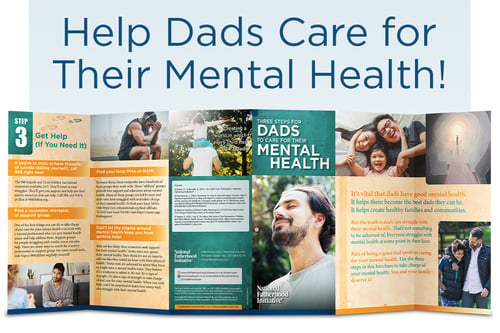
Unless you’ve been hiding under a rock lately, you know there’s an increasing emphasis on helping dads in a vital area of self-care: taking care of their mental health.
Caring for your mental health is critical to your overall health and well-being. Research is clear that poor mental health negatively impacts your physical health and vice versa. You can’t sacrifice one to focus on the other. They work in tandem.
And yet, gym rats fill our nation’s health clubs.
Why?
Because it’s a lot easier for us men to admit and accept the need to work on our physical health than on our mental health. (Ditto for this gym rat!) Unfortunately, that lack of balance negatively affects our ability to be the best dads we can be.
Fortunately, National Fatherhood Initiative® (NFI) is helping organizations like yours to help the dads you serve care for their mental health. And we’ve got an exciting new resource on mental health that I’m itching to share with you. But first, let me provide context for why you need this resource.
How Big is The Mental Health Struggle?
Let’s start with these data points:
- According to Mental Health America, 1 in 10 men experience depression or anxiety; unfortunately, less than half will receive treatment, and more than four times as many men as women die by suicide yearly
- According to the National Institute for Children's Health Quality, around 1 in 10 new fathers experience Paternal Postpartum Depression, and up to 16% deal with an anxiety disorder during the weeks before and after birth
- There’s an association between dads' mental health and the quality of their co-parenting relationships—dads who report mild or serious psychological distress are likelier to report lower-quality co-parenting relationships
After reading the first two data points, you might have said, “Wow. While concerning, that’s only 10% of men and dads who experience those issues.”
That’s fair. But one of the insights I’ve gained from my training as a social scientist is the importance of looking beyond the numbers to what’s not there—what’s not being said or reported.
In this instance, the data captures only the men and dads who seek help and are diagnosed with those issues.
How many more men and dads are walking around undiagnosed with those and other issues?
I’ll venture substantial numbers.
So, it stands to reason that among the dads you serve, some of them, and perhaps many of them, have mental health challenges. That’s especially true if you serve a population of dads who are more likely to have those challenges, such as those with alcohol and substance abuse or dependency.
NFI’s New Evidence-Informed Resource on Caring for Dads’ Mental Health
The bottom line is that dads need to have good mental health. As the third data point above illustrates, it helps them be the best dads they can be and helps create healthy families and communities. It's vital that you proactively address mental health with dads.
A great, new way to do just that is to acquire and distribute NFI’s newest evidence-informed brochure, Three Steps for Dads to Care for Their Mental Health. Available in English and Spanish, this painstakingly-researched, comprehensive brochure ties taking care of mental health into the strong motivator of doing what’s necessary to be the best dad possible. It introduces dads to the following steps:
- Learn About Mental Health
- Care for Mental Health
- Get Help if Needed
Dads learn about a host of trustworthy resources that help them take those steps.
Moreover, the brochure frames taking care of mental health as the sign of strength that it truly is, not something to be ashamed of. That frame addresses a primary barrier to men seeking help for their mental health—that doing so is a sign of weakness or that you’re less of a man.
Use this brochure with small and large audiences of dads in a variety of ways, including:
- Introducing dads to mental health resources for the first time
- Reinforcing and adding content on mental health in NFI’s fatherhood programs (curricula) or in any fatherhood program
- Giving it to the moms you serve to give to the dads of their children
- Placing it in your lobby and the offices of your community partners or locations around your community frequented by dads
- Distributing it at fatherhood and other events that you or your partners sponsor/hold
- And many more!
I encourage you to learn more about and acquire the brochure here. As with all our brochures, you can peruse the content before acquiring it. I also encourage you to share the availability of this new resource with your community partners that also serve dads.
Interested in learning more about how NFI resources address men’s mental health? Click here and here to read previous articles.
